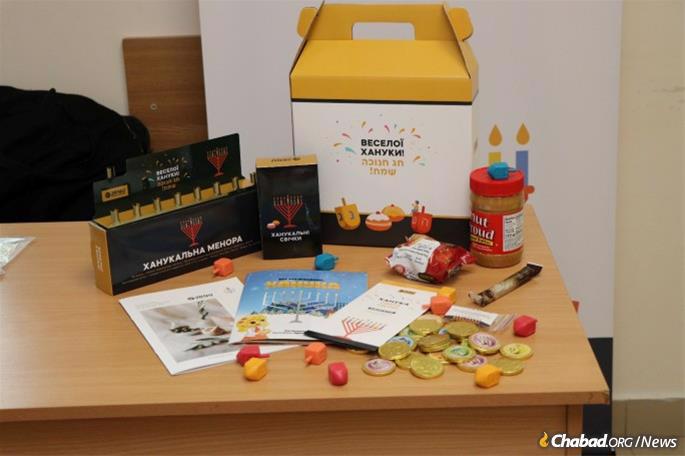On Sunday afternoon, Inna Shapiro will make her way to the grand Chabad Choral Synagogue in the city of Kharkov, Ukraine, where she will help usher in the holiday of Chanukah surrounded by hundreds of other Jews. Then, amid the darkness of a city with limited electricity and regular blackouts, she will head home and light her own modest menorah on her windowsill.
“For the last 10 months, we were able to celebrate our Jewish holidays despite all the difficulties, and Chanukah is not going to be the exception,” said Shapiro. “I’m going to try to celebrate like before with tasty latkes. We are going to spin the dreidel, and I’m even going to give my son Chanukah gelt. He’s already a grown adult, but that’s the tradition.”
She added that this year’s Chanukah candles “will not just light the menorah since they may be the only light in the total darkness of our city. Through our Chanukah lights, the Jewish families in Ukraine will make our country that much lighter and brighter. Everyone is waiting for a miracle, and we hope the miracle of Chanukah will bring us closer to a real peace.”
Across the vast country in Uzhgorod, in Western Ukraine, local Jews will join with refugees from the nation’s east to mark the first night of Chanukah. Unlike most of the nation, where it is too dangerous to gather outside, a large menorah will be lit outdoors in the center of town followed by a special holiday event at a large theater.
“We rented out a theater that used to be a shul, which is the largest hall in the Carpathian region,” says Sarah Wilhelm, who along with her husband, Rabbi Mendel Wilhelm, directs Chabad-Lubavitch of Uzhgorod. “The location is symbolic because the older people remember it used to be a synagogue. We hired a team of performers and gave them a copy of the story of Chanukah, which they will act out in Ukrainian with song and dance.”

“We have a menorah on a tractor that will be in the center of the city near the synagogue,” she continues. “The governor of Carpathia will light the shamash, and my husband will light the first candle. Then everyone will come inside for the performance, followed by a dessert buffet with doughnuts and Chanukah gelt, tea and coffee,” she continues, adding that the children will get Chanukah presents.
While this may not sound all that surprising in other years—Chabad emissaries will be hosting menorah-lighting and Chanukah events around the world—the celebrations in Ukraine will be different. They come amid the ongoing conflict in the region and as the cold winter months have settled in, and electricity remains elusive in places. That explains why the Wilhelms will also be distributing cold-weather gear, such as blankets and rechargeable lights, in addition to traditional holiday fare.
Similar cold-weather gear will be distributed in the town of Sumy by Chabad emissaries Rabbi Yechiel Shlomo and Rochi Levitansky. The Levitanskys are putting the finishing touches on plans for their community’s Chanukah celebrations, including an outdoor menorah lighting and a menorah car parade.
Rabbi Levitansky said Chabad will also visit as many Jewish residents as possible. “We will split up into groups, and every group will visit seven or eight homes a night,” he says, adding that the goal is “to visit everybody that we know on Chanukah, and light the menorah with them and make a Chanukah party in their home.”

Helping Every Jew Celebrate
Throughout Ukraine, a network of hundreds of Chabad-Lubavitch emissaries and volunteers are working to ensure that beleaguered residents are able to celebrate the “Festival of Lights.” More than 40,000 Chanukah boxes filled with holiday supplies and special treats will be distributed to Jews in every city and village throughout Ukraine, says Rabbi Shlomi Peles, who heads the Jewish Relief Network Ukraine (JRNU), Chabad’s boots-on-the-ground humanitarian network. The kits will include a menorah, candles, dreidels, a Chanukah book for children, chocolate gelt, a Swiss chocolate bar and more.
The Chabad emissaries will be joined in Ukraine by a group of 25 rabbinical students from Israel and the United States. The students will help ensure that as many Jews as possible get a visitor on Chanukah and can celebrate during the eight-day festival.
“Everybody should be able to celebrate Chanukah and shine a light in the darkness,” says Peles, especially in Ukraine, which, he notes, is in literal darkness.

Holiday Moves Indoors in Nation’s East
“Chanukah will be different this year,” says Miriam Moskovitz, who with her husband, Rabbi Moshe Moskovitz, has been leading Chabad of Kharkov in Eastern Ukraine for some 30 years. “Last year, we had public menorah lightings in more places than ever with seven menorah lightings outside, including one with the mayor of Kharkov in attendance. We had fireworks and menorah parades.
“This year, we are still making sure that Chanukah will be bringing light and warmth to everybody,” she continues. “We are giving out hundreds of warm blankets this week, and we will be handing out 2,000 food packages and hundreds of menorahs.”
The Chanukah program at the Chabad Choral Synagogue, which Shapiro is attending, will start at 2 p.m., before the official start of the holiday at sundown, because as Moskovitz explains, by 4 p.m. it is pitch-black in Kharkov and there are no streetlights, and people don’t like to be out at night.
While there will be no giant public outdoor menorah lightings in Kharkov this year, Chabad has set up large menorahs inside five area department stores—one of the few places where people are out and about this year—and has an electric menorah that will remain lit outside of the Choral Synagogue during the eight days of the holiday.
“We will also have menorahs on our cars and will be driving through the city,” says Moskovitz, adding that they hope to visit “each and every home and light the menorah with every Jewish person and family.”
Small indoor celebrations will also be held in the southern port city of Kherson, where menorahs and Chanukah candles are being distributed to members of the Jewish community.
“Donuts will be fried in the synagogue and distributed to the community,” said Rabbi Yosef Yitzchak Wolff of Chabad of Kherson, adding that the plan is to “organize a small, but very warm festive feast.”
“Due to the situation in the city, we still do not have information about whether it will be possible to place the central menorah in the city,” he continued, “but in the synagogue, we will light candles on every one of the eight days!”
According to Judi Garrett, COO of the JRNU, much of the aid to Ukraine is focused on the spiritual as it is on the material. “We are a humanitarian organization,” notes Garrett. “We have to take care of people beyond just food, water and medicine. We have to take care of their mental well-being and souls as well.
“For 10 months, these adults and kids have been enduring trauma,” she continues, “and to see the kids get these gifts and the Chanukah packages, you can feel the emotional warmth. Celebrating Chanukah as Jews have done for centuries allows Ukrainian Jews to feel supported and connected to Jews around the world; it reminds them they are not alone, not forgotten.”
To assist the Jewish communities of Ukraine, donations can be made at the JRNU web site.








Join the Discussion